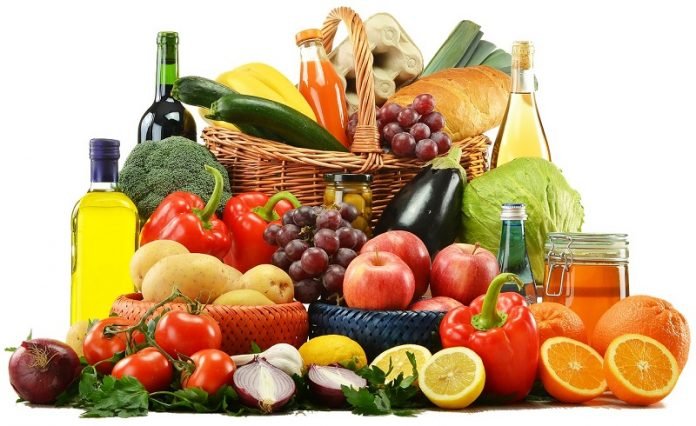
The holiday season is here, but unfortunately, so is the second wave of COVID-19 cases.
As the days get cooler and wetter and the flu begins to circulate again, coronavirus prevention efforts—such as social distancing and wearing face coverings—are more important than ever.
Thankfully, an effective vaccine appears to be on the horizon.
But until then, what else can we do to safeguard ourselves from infection?
There is now ample evidence suggesting that critical COVID-19 cases are usually linked to such concurrent factors as obesity, diabetes, hypertension or heart disease—chronic conditions often related to poor diet.
Furthermore, a balanced diet supplies the body with a range of macro- and micronutrients that prime the immune system to prevent or fight disease. Proper nutrition could help us at least avoid the most severe symptoms.
However, notes Jody Margolis, registered dietitian nutritionist at UCI’s Student Health Center and Center for Student Wellness & Health Promotion, “there are health disparities and social justice issues that contribute to a poor diet, unhealthy weight and increased risk of developing chronic conditions that may raise one’s risk for a poor outcome related to COVID-19.”
The good news is that eating healthy doesn’t have to be expensive or terribly time-consuming. Below are tips on how to fortify the immune system by eating the right foods while staying within one’s budget.
Eat the rainbow
Consuming whole foods is a guaranteed way to get a full range of vitamins. “A mostly plant-based diet including a rainbow of color from fruits and vegetables is a good start,” Margolis says.
“The variety of color provides different phytonutrients—chemicals with antioxidant and anti-inflammatory benefits—that are important to keeping us healthy.” Pairing vibrant plants with a good source of protein, such as beans, eggs, fish, poultry, tofu or lentils, is also advised.
The gut microbiome also benefits from diversity. Margolis recommends eating seasonal, local foods as the days change. Produce that’s grown regionally and in season is more abundant, so it’s less expensive.
For fall, try adding the following items to your daily meals:
- Root vegetables: beets, carrots, turnips, parsnips and sweet potatoes
- Squashes: acorn squash, spaghetti squash, zucchini and pumpkin
- Crucifers: kale, arugula, Brussels sprouts, broccoli and cauliflower
- Fruits: tangerines, pomegranates, persimmons, pears and apples
Saving money while eating healthy
Unfortunately, food insecurity is often at the root of malnutrition.
To combat this issue, UCI’s FRESH Basic Needs Hub offers various food assistance services for students, such as a fully stocked pantry, emergency meal swipes, grants and consultations.
Its Farm-to-FRESH program provides vouchers to use at a local farm’s drive-thru produce section.
Although fresh ingredients are desirable, frozen fruits and vegetables are just as healthy, Margolis says. Beans and grains, canned protein and frozen fish can also be inexpensive and packed with vitamins.
No fancy cooking skills necessary
For quick, nutritious meals, Margolis suggests “nourish bowls,” which in some cases require no cooking.
They typically include a base of grains, which can be brown rice, quinoa, farro or barley; a protein source such as canned beans (drained and rinsed), tofu, hummus or cheese; fresh, steamed or sautéed veggies of all kinds; and simple salsas or dressings.
Each bowl can be tailored to a particular ethnic palate—Southwestern, Asian or Mediterranean, for example. They are wholesome, balanced and open to variety.
If you’re in the mood for a seasonal twist but don’t want to make anything complicated, Margolis recommends adding canned pumpkin purée to smoothies, oatmeal or even marinara sauce. “Pumpkin is rich in antioxidants as well as potassium and fiber,” she says.
“Just make sure to buy canned 100 percent pumpkin purée and not canned pumpkin pie filling.”
A wholesome holiday feast
Give this year’s festivities a healthy spin by preparing some of these dishes curated by Margolis. They’re equally easy, affordable and delicious.
- Seasonal salad: Combine leafy greens, dried cranberries, half a chopped pear or apple, diced onion to taste, and a vinaigrette of your choice.
- Wholesome boxed stuffing: Follow the instructions on the box and sauté a cup or two of chopped celery, carrots, onions and apple or pear in 1 tablespoon of olive or canola oil. Toss in some almonds or pecans. Add these ingredients to the stuffing for extra nutrition, flavor and crunch.
- Enhanced boxed macaroni and cheese: Follow the recipe on the box but add a few tablespoons of canned pumpkin purée, plain Greek yogurt and parmesan cheese. Heat and serve for a holiday twist and immune boost.
- Microwaved sweet potato: Wash and pierce it four or five times with a fork, then cook for five to six minutes, turning once. If not fork-tender, keep cooking in 30-second intervals. Cut it lengthwise with a knife and serve with a tablespoon of butter or vegan spread and a sprinkle of brown sugar or cinnamon.
- Healthier mashed potatoes: Follow your favorite recipe for mashed potatoes but add cooked cauliflower (frozen or fresh) for some texture and bonus nutrients.
- Roasted vegetables: Butternut squash, Brussels sprouts, carrots, sweet potatoes and parsnips are in season and rich in flavor when caramelized in the oven. Wash and cut them into bite-sized pieces, toss with a few tablespoons of olive or canola oil, sprinkle with salt and pepper, and place on a cookie sheet. Bake at 400 degrees for 20 minutes or until veggies are tender and slightly browned.
- Dessert: Slice an apple or pear—leave the skin on for fiber—into thin pieces. Sauté in a pan over medium heat with 1 or 2 tablespoons of butter and sprinkle with brown sugar and cinnamon or pumpkin pie spice. Serve by itself or enjoy over a scoop of vanilla ice cream or yogurt. For added crunch and heart health, top with some chopped almonds, walnuts or pecans or your favorite granola.
Written by Lilibeth Garcia.



